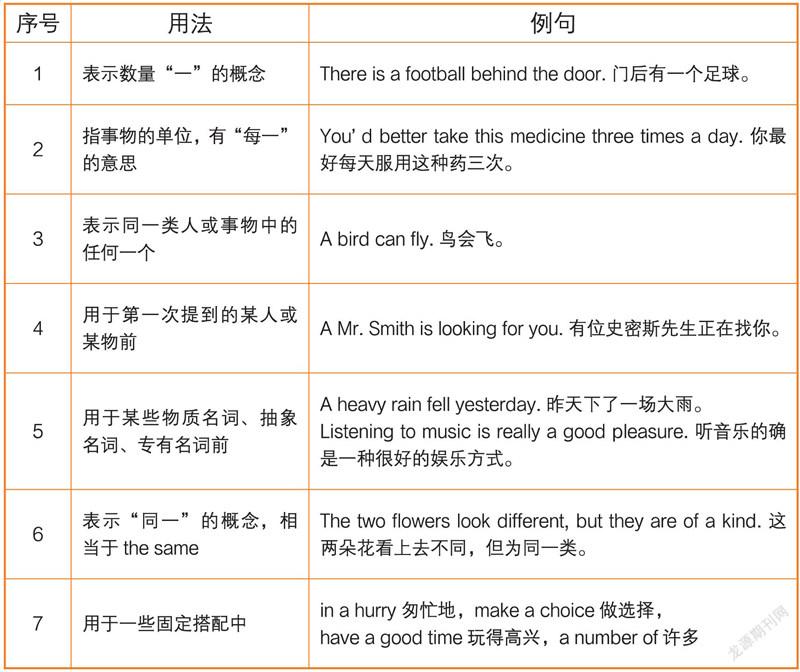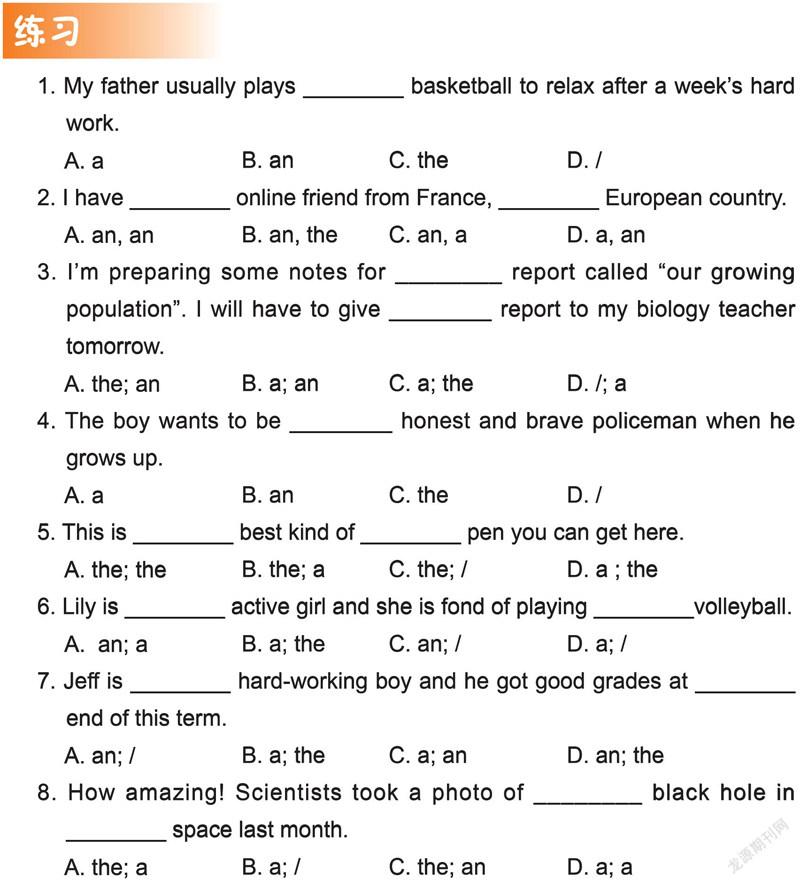冠词
高洁





命题趋势
冠词是一种虚词,是名词的一种标志,不能独立担任任何句子成分,只能附着在名词上,帮助说明其词义。冠词的考查,往往集中于a和an的用法区别、定冠词的用法、不用冠词的情况、习惯用语中冠词的用法等几个方面。考查形式以单项选择为主,有时也会在完形填空、完成句子等类型的题目中出现。在学习过程中,不但要掌握不同类型的冠词的用法,还要注意习惯搭配中冠词的使用情况。
考点解析
考向一:冠词的基本用法
一、不定冠词a、an的用法
1. a和an都用于可数名词单数前,泛指人和物,表示可数事物中的一个。但两者用法有区别:
(1)若随后的单词以辅音音素开头,用a。如:a lot of,a good idea,a pear。
(2)若随后的单词以元音音素开头,用an。如:an example,an orange,an apple。
注意:某些以元音字母开头的单词用a,因为其第一个音是/ j /。如:a university,a European language。
某些以字母 h 开头的单词用an,因为这些单词的“h”不发音。如:an honest boy,an hour ago。
知识拓展
1.动宾短语中,与动词“同源”的名词前一般要加不定冠词,如:
sleep a sound sleep 睡得很香
smile an attractive smile 笑得迷人
fight a hard fight 进行艰苦的斗争
live a happy life 过幸福的生活
2. 惯用短语中的不定冠词
have a word with sb 同某人谈话
have a good time 玩得高兴
have a headache 头痛
go for a walk 散步
tell a lie 撒谎
with a smile 微笑着
as a result 因此
for a moment/ while 一会儿
make a face 做鬼脸
take an active part in 积极参加
as a whole 作为整体
once upon a time 从前
have a try 试一下
have a look 看一看
have a good sleep 好好睡一觉
take a bath 洗澡
wait a moment 等一会儿
with an effort 努力地
once in a while 偶尔
in a hurry 匆忙地
do sb a favour 帮某人忙
at a time 每次
all of a sudden 突然
in a word 总之
二、定冠词the的用法
1. 用于特指某(些)人或某(些)事物
▶This is the city where my grandfather once lived. 这是我祖父曾经生活过的城市。
▶The cellphone is on the table. 手机在桌子上。
2. 用于指谈话双方知道的人或事物
▶What is the manager doing about all this? 对于这些事情,经理正在做什么?
▶Would you mind my opening the window? 你介意我打开窗户吗?
3. 用于复述上文提过的人或事物(第一次提到用“a或an”,再次提到用“the”)
▶Jim lives in a small village. In the village, there is an old tree. 吉姆住在一个小村庄里,村庄里有棵老树。
4. 用在序数词和形容词最高级前
▶Spring is the first season of a year. 春季是一年中的第一个季节。
▶This is the most interesting movie I have ever seen. 这是我看过的最有趣的电影。
5. 表示世界上独一无二的事物
the sun 太阳 the moon 月亮 the earth 地球
▶The sun is much bigger than the earth. 太阳比地球大得多。
6. 用于由普通名詞构成的专有名词前
the Great Wall 长城 the United States 美国 the United Nations 联合国
7. 用于表示方向、方位的名词前
in the east 在东方 in the front 在前面 at the back 在后面
in the bottom 在底部 at the top 在顶部 on the right 在右边
8. 用在表示计量的(度量衡)名词前
by the ton/pound/yard/metre/kilo,by volume/weight/length/width/depth
注意:by后面接表示面积、体积、重量、长、高、短、深时,中间不加冠词。
9. 在海洋、江河、湖泊、山脉、海峡、海湾等地理名词前
the Pacific Ocean 太平洋 the Huanghe River 黄河
the Tianshan Mountains 天山山脉 the Taiwan Straits 台湾海峡
▶The Nile is the longest river in the world. 尼罗河是世界上最长的河流。
10. 在姓氏复数前,表示一家人
▶The Whites are going to visit China next month. 怀特一家人下个月打算来中国。
▶The Blacks are going to Xi’an next week. 布莱克一家下周准备去西安。
11. 和某些形容词连用,表示一类人或物
the poor 窮人 the rich 富人 the sick 病人 the wounded 伤员
▶The rich are not always happier than the poor. 富人并不总比穷人开心。
12. 在the more ... the more比较级的句式中
▶The more you exercise, the more strong you are. 你锻炼得越多,就会越强壮。
13. 用在西方乐器单数可数名词前
play the piano 弹钢琴 play the violin 拉小提琴
* 中国乐器名词前不与冠词连用:play erhu 二胡
▶I practice playing the piano every day. 我每天练习弹钢琴。
14. 用在可数名词单数前可以表示一类人或事物
▶The panda is a cute animal. 熊猫是可爱的动物。
▶They are the doctors of this hospital. 他们是这个医院的医生。
15. 用于固定结构“动词+sb. +介词+the+身体某一部位”中,常见的此类动词有take,catch,hold,seize,hit,cut,strike,lead,pat等
take sb by the arm 抓住某人的手臂 hit sb in the face 打某人的脸
▶The policeman seized the thief by the arm and struck him on the back. 警察抓住小偷的胳膊,打了他的背。
16. 用在世纪或“世纪+年代”名词前
in the18th century 在18世纪 in the 1960s 在20世纪60年代
▶The palace was built in the 15th century. 这座宫殿建于15世纪。
17. 用于某些特指的抽象名词、物质名词前,尤其是其后有限制性定语修饰时
▶The young generation is the hope of the world. 年轻一代是世界的希望。
▶The three children are the joy of my life. 这三个孩子是我生命中的乐趣。
18. 用在某些固定的表达上。
in the morning 在早上 in the afternoon 在下午
in the evening 在晚上 go to the cinema 去看电影
in the world 在世界上 all the year round 一年到头
考向二:不用冠词的情况
【知识拓展】
冠词的省略主要指可用、可不用冠词的情况,如下:
1. 文章标题、书名、广告语中等,在不引起歧义的情况下,冠词可以省略,从而使行文更加简明。
▶Fully furnished flat to let 全新装修公寓出租(广告)
2. 两个并列名词前面都有相同冠词时,第二个名词前的冠词常被省略。
▶Is the baby a boy or (a) girl? 这个宝宝是男孩还是女孩?
考向三:冠词的位置
【助学记忆】
1.名词前用不用冠词,用哪一个冠词,一般取决于三个基本因素:可数名词还是不可数名词,单数名词还是复数名词,特指还是泛指。
2.单数可数名词前除非有其他限定词(如指示代词、物主代词等)修饰,否则必须加冠词。

